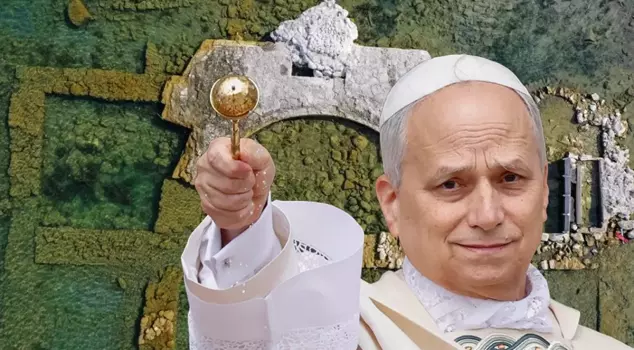
26.11.2025 09:57
The spiritual leader of the Catholic world, Pope Leo XIII, will make his first foreign visit to Turkey tomorrow after taking office. The Pope's first stop will be Ankara. He will first go to Anıtkabir and then meet with President Erdoğan at the Presidential Complex in Beştepe. The next day, the Pope will travel to Istanbul, and after his meetings there, he will go to İznik to visit the ruins of the Basilica of Saint Neophytus and participate in a special ceremony to commemorate the 1700th anniversary of the First Council of Nicaea.
The spiritual leader of Catholics, Pope Leo XIII, is coming to Turkey tomorrow. Leo, who was elected pope 6 months ago, will make his first foreign visit to Turkey. Pope Leo will have a busy schedule in Ankara, Istanbul, and Iznik.
VISIT TO ANITKABİR AND BEŞTEPE
According to DW's report, Pope Leo XIII's first stop will be Ankara. The Pope, who will arrive in the capital tomorrow, will begin his visit at Anıtkabir. He will then be officially welcomed at the Beştepe Presidential Complex and will meet with President Recep Tayyip Erdoğan.
AFTER ANKARA, TO ISTANBUL
After completing his meetings in Ankara, Pope Leo will move to Istanbul on the same day, where he will meet with Christian clergy at the Saint Esprit Cathedral in Harbiye on Friday morning. He will then visit the French Poor House in Feriköy, which serves the poor.
After these meetings, Pope Leo will travel to Iznik by helicopter.
HE WILL ATTEND A SERVICE IN İZNİK
This year marks the 1700th anniversary of the First Council of Nicaea, which holds significant importance in Christian history. Pope Leo will visit the ruins of the Basilica of Saint Neophytos, which was once submerged, located by the shores of Lake Iznik, and will participate in a special service there.
SULTANAHMET AND THE FENER GREEK PATRIARCHATE
Pope Leo XIII will hold a special meeting with bishops upon his return to Istanbul. On Saturday morning, like previous popes, he will visit the Sultan Ahmed Mosque. He will then meet with representatives of Christian communities at the Mor Efrem Syriac Ancient Orthodox Church in Yeşilköy.
Another important stop of the visit will be the Fener Greek Patriarchate. Pope Leo will meet with Patriarch Bartholomeos and the two religious leaders will sign a joint statement.
BUSY SCHEDULE: SERVICES AND A JOURNEY TO LEBANON
Pope Leo will lead a service at the Volkswagen Arena, which will be attended by thousands of people on the same day. On the last day of his visit, he will participate in a service at the Armenian Apostolic Cathedral.
At the end of the program, Pope Leo will revisit the Fener Greek Patriarchate and have lunch with Patriarch Bartholomeos. He will then move to Beirut, the capital of Lebanon, to begin the second leg of his foreign tour.
POPE LEO XIII WILL BE THE 5TH POPE TO VISIT TURKEY
Pope Leo XIII will be the 5th pope to visit Turkey with his visit scheduled for November 27-30. Previously, Pope Francis visited Turkey in 2014, Pope Benedict XVI in 2006, Pope John Paul II in 1979, and Pope Paul VI in 1967.
WHAT IS THE SIGNIFICANCE OF THE COUNCIL OF İZNİK?
According to some reports in the Turkish press, 15,000 Christians are expected to attend the prayer that Pope Leo XIII will hold in Iznik. Security measures in Iznik have been heightened ahead of the visit.
The first council meeting is believed to have taken place on the shores of Lake Iznik and later in a basilica that was submerged. The remains of the basilica were found on the lakebed in 2014.
The Council of Nicaea is the first ecumenical council of Christian history, convened in 325 AD at the invitation of Roman Emperor Constantine I in present-day Nicaea. The main purpose of the council was to resolve some significant theological disputes within Christianity, particularly regarding the nature of Jesus Christ and the relationship with God the Father, and to ensure the unity of the church.
The most important outcome of the council was the acceptance of the first part of the Nicene Creed, which forms the foundation of the Christian faith.
For this reason, the Council of Nicaea is known as a turning point that officially defined the fundamental doctrines of the Christian faith, sought to ensure unity in the church, and shaped the relationship between Christianity and the empire.